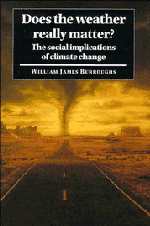4 - Storms, floods and droughts
Published online by Cambridge University Press: 26 February 2010
Summary
‘The time has come’, the Walrus said,
‘To talk of many things:
Of shoes – and ships – and sealing wax
Of cabbages – and kings –
And why the sea is boiling hot –
And whether pigs have wings.’
Through the Looking-Glass, Chapter 4
It may seem a little perverse to pay so much attention to cold winters, given global warming is in the forefront of people's thinking. It is worth recalling, however, that in the late 1960s and early 1970s the possibility of global cooling was in the forefront of many climatologists' thinking. Subsequent climatic events have completely reversed this perspective and now the vast majority are now concerned with warming rather than the next Ice Age. The scale of this shift in opinion and the messages about the non-linear response of economic and social systems to extreme weather make the examples of cold winters of relevance, whether or not they will become a less frequent part of our future.
When it comes to current climatic developments most people are worried about the mixture of storms, floods and droughts that seem to be a growing feature of the weather. Central to the debate is the whole question of whether global warming is producing a more extreme weather and what the role of the oceans will be in these changes. Of particular interest are the quasiperiodic fluctuations in the equatorial Pacific Ocean (the El Niño Southern Oscillation, ENSO), the associated changes in sea-surface temperature (SST) and rainfall patterns throughout the tropics, and their possible connections with weather patterns at higher latitudes.
- Type
- Chapter
- Information
- Does the Weather Really Matter?The Social Implications of Climate Change, pp. 73 - 99Publisher: Cambridge University PressPrint publication year: 1997



